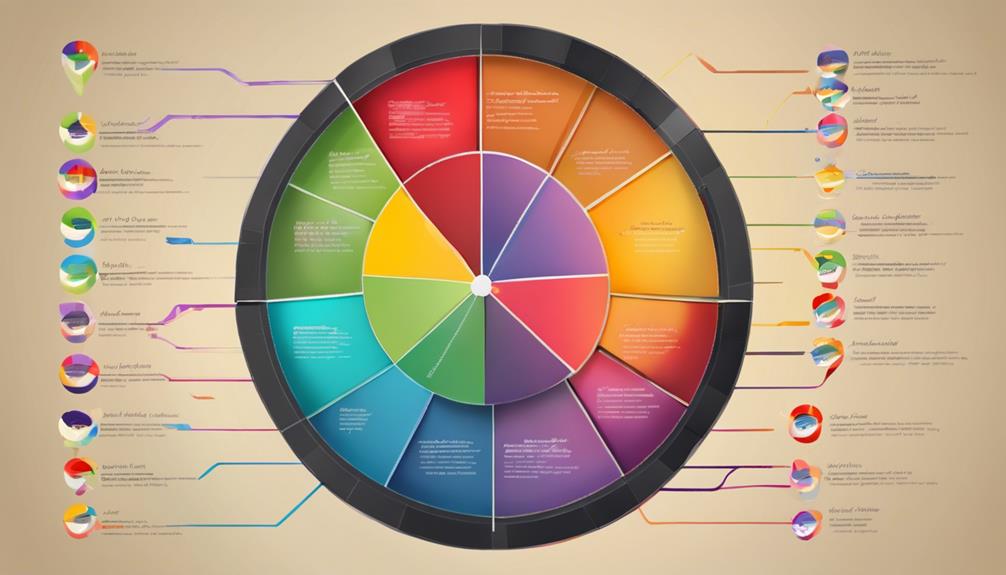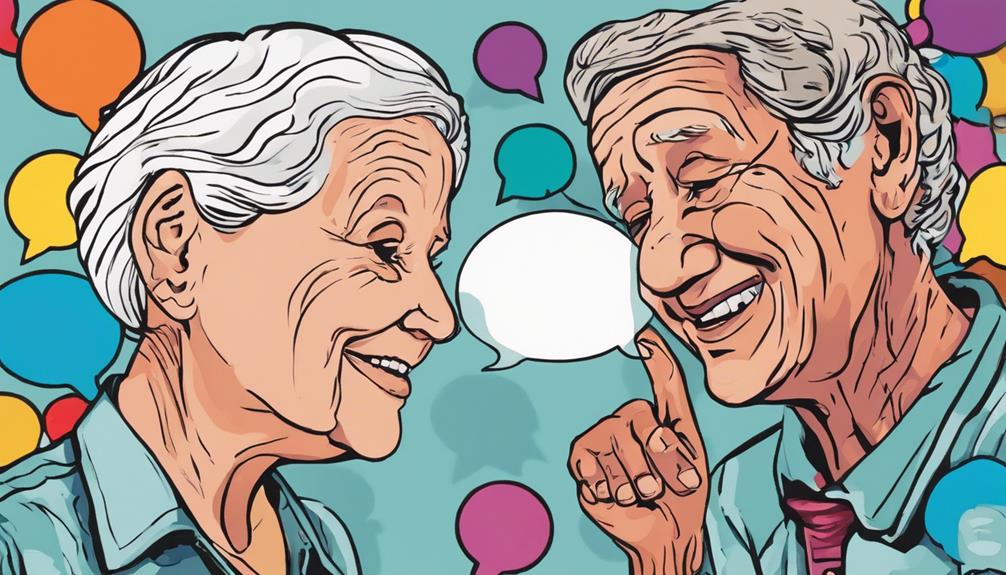When interacting with people with dementia, it’s important not to overlook the positive impact that simple, cheerful questions can have on creating valuable connections and encouraging happy exchanges.
Curious about how simple inquiries can unlock treasured memories and bring smiles to seniors’ faces?
Stay tuned to discover a variety of engaging question categories that can enhance communication and create heartwarming moments with individuals living with dementia.
Icebreaker Questions
Let’s explore how icebreaker questions can gently spark conversations and memories for dementia patients. When engaging with our senior loved ones in memory care, using simple sentences and engaging questions can help stimulate memory and cognitive function. Icebreaker questions should be easy to understand and answer, focusing on past memories, preferences, or experiences. By asking these types of questions, we create a positive and interactive environment for dementia patients, fostering connection and communication.
Icebreaker questions play a crucial role in initiating conversations with individuals experiencing dementia. These questions act as bridges to the past, allowing them to reminisce and share their stories. Through these interactions, we not only learn more about our loved ones but also help them feel valued and understood. Icebreaker questions serve as tools to unlock precious memories and create moments of joy and connection in their lives.
Memory Lane Queries

Exploring memory lane queries can evoke cherished moments and meaningful dialogues for individuals with dementia. It’s a way to travel back in time and care for their emotional well-being by engaging them in conversations about their past experiences.
Here are some questions to help spark those connections:
- Family Events: Asking about memorable family gatherings or celebrations can bring back heartwarming memories and allow them to share stories about loved ones.
- Life Experiences: Inquiring about significant life events or achievements can help dementia patients reflect on their accomplishments and feel a sense of pride.
- Favorite Hobbies: Discussing hobbies they enjoyed in the past can help them reminisce about joyful activities and the things that brought them happiness.
- Love Stories: Encouraging them to share tales of romance or enduring relationships can foster a sense of connection and evoke feelings of love and companionship.
Humorous Inquiries
Engaging in light-hearted conversations with dementia patients can bring moments of joy and laughter, fostering a positive and uplifting interaction. Humorous inquiries play a vital role in creating a warm and friendly atmosphere for dementia patients.
Asking light-hearted questions can evoke laughter and spark memories, leading to amusing responses that brighten the mood. Simple jokes or funny anecdotes can help dementia patients feel more relaxed and engaged during conversations, making the interaction more enjoyable for everyone involved.
By incorporating humor into our interactions, we can build rapport and strengthen the bond with dementia patients. These positive interactions not only bring laughter but also create lasting memories of shared moments filled with joy.
Personal Preferences Poll

Understanding the personal preferences of dementia patients is key to fostering meaningful conversations and creating a supportive environment for their care. When engaging with seniors with dementia, taking the time to learn about their personal preferences can significantly enhance the quality of interactions and help evoke positive memories.
Here are some tips on how to conduct a personal preferences poll:
- Favorite Activities: Ask about the activities they enjoy doing or used to do in the past.
- Preferred Hobbies: Inquire about hobbies they may have had or currently engage in.
- Favorite Foods: Discuss their favorite meals or snacks to spark pleasant memories.
- Music Preferences: Explore the type of music they like listening to for soothing and engaging moments.
Creative Thinking Prompts
To enhance the cognitive abilities and emotional well-being of people with dementia, introducing creative thinking prompts can be incredibly beneficial. Creative thinking prompts can spark imagination, engage individuals, and encourage them to explore their thoughts and memories in a positive way. By asking open-ended questions, we can stimulate cognitive abilities and promote self-expression in seniors with dementia. These prompts also trigger reminiscence, allowing individuals to connect with their past experiences and share stories from their lives. Engaging in creative thinking activities can significantly enhance emotional well-being and cognitive function in dementia patients.
| Creative Thinking Prompts | Benefits | Examples |
|---|---|---|
| Spark Imagination | Encourages creativity and engagement | “If you could visit any place in the world, where would you go?” |
| Promote Self-Expression | Allows individuals to express themselves | “Tell me about a special memory that brings you joy.” |
| Connect with Past Experiences | Facilitates reminiscence and storytelling | “Can you share a story from your childhood that you remember vividly?” |
Frequently Asked Questions
What Are Good Questions to Ask Dementia Patients?
When engaging with dementia patients, we find that asking open-ended questions about past memories, hobbies, relationships, and accomplishments can foster meaningful conversations. These inquiries trigger positive emotions, promote self-esteem, and help share life experiences.
Encouraging reminiscing about funny or hopeful moments brings joy and laughter. By discussing significant aspects of their lives, we help them feel valued and connected. This approach creates a supportive and engaging environment for dementia patients.
What Do Dementia Patients Like to Talk About?
We find that dementia patients enjoy reminiscing about past memories, discussing family and friends, and sharing significant life events. Engaging in conversations about hobbies, interests, favorite music, movies, or books can trigger positive emotions.
Sharing funny or hopeful moments from the past often leads to meaningful interactions. What they like to talk about reflects their desire for connection and joy in reliving cherished experiences.
How Do You Lift Someone With Dementia?
When lifting someone with dementia, we approach them calmly, maintaining eye contact to reduce anxiety. We use clear cues and provide physical support as needed, using proper techniques to prevent injuries. Assistive devices like transfer belts can facilitate safe movements.
Throughout the process, we prioritize the person’s comfort and dignity, respecting their autonomy and preferences. Our goal is to ensure a safe and respectful lifting experience for both the individual and the caregiver.
When a Person With Dementia Says They Want to Go Home?
When a person with dementia says they want to go home, it’s vital to remember that it may not always be about a physical place. It could be a yearning for comfort, safety, or familiarity.
Acknowledge their emotions, offer reassurance, and show empathy. Understanding the underlying feelings behind their words can guide us in providing the support and comfort they need.
It’s about creating a sense of security and connection in their world.
Conclusion
As we wrap up our fun questions session with dementia patients, we can’t help but feel grateful for the special moments shared. The laughter, the stories, the connections made – all precious memories to cherish.
But wait, there’s more to come! Stay tuned for more engaging activities and heartwarming conversations to brighten our days and create lasting bonds.
Join us on this journey of joy and connection as we continue to uplift spirits and create meaningful experiences together.









